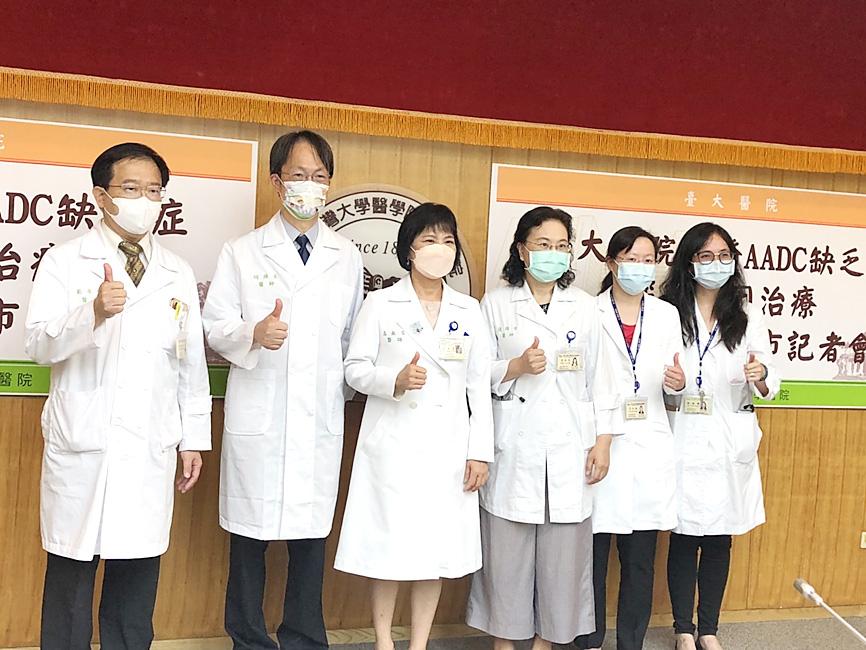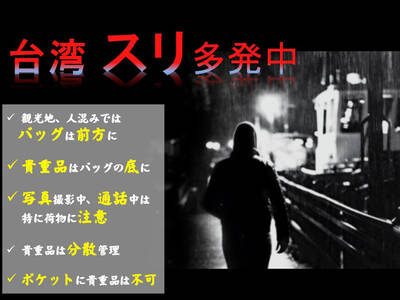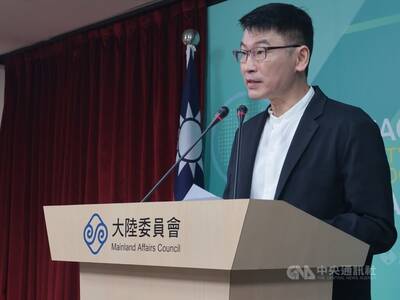Taiwanese scientists have created the first genetic treatment approved by the EU for L-amino acid decarboxylase (AADC) deficiency, an extremely rare and fatal disorder, they said yesterday.
The treatment, given the trade name Upstaza, was on Wednesday approved for market by the European Medicines Agency, the EU’s main drug regulator, the National Taiwan University Hospital-based research team told a news conference.
AADC deficiency inhibits the secretion of an enzyme that is key to making dopamine, said team leader Hu Wu-liang (胡務亮), who is also the director of the hospital’s pediatrics and genetic medicine departments.

Photo: Yang Yuan-ting, Taipei Times
The disorder primarily manifests in infants and severely impedes their ability to develop speech, walk, sleep or swallow food, with death typically occurring before the age of five, he said.
The condition affects about 700 children in Taiwan, comprising 30 percent of the world’s AADC cases, suggesting that the genetic trait causing the disorder has a strong regional prevalence, Hu said.
As cases are rare in North America and Europe, where most of the world’s drugs are made, there was a lack of impetus among Western drugmakers to develop a treatment for the condition, he said.
In response, Hu launched an initiative to find a cure, and received the university hospital’s approval in his effort, which led to the creation of Upstaza in 2010, he said.
Upstaza is a one-time treatment that introduces a functioning AADC gene to the patient by directly injecting it into the patient’s brain, using modified adeno-associated viruses as the vehicle mechanism, Hu said.
An affected person with the replaced AADC gene would gain the ability to produce dopamine, leading to a partial recovery of bodily functions and providing hope for a normal life, Hu said, adding that the therapy has been proven by a 12-year tracking study.
A two-year-old patient who had been bedridden and unable to speak gained the ability to run, use staircases unassisted and verbally communicate within four years of receiving the treatment, he said.
“Using the technology, the hospital successfully treated the 30 Taiwanese patients [with AADC] to bring hope to their families,” Hu said.
The rights to the drug have been transferred to US-based PTC Therapeutics, which is exploring the possibility of applying Upstaza’s underlying viral and surgical technology to treat other conditions affecting the brain, he said.
Upstaza cannot be used for Parkinson’s disease, as the treatment requires intact neurons to work, Hu added.

The Japan-Taiwan Exchange Association has cautioned Japanese travelers to be vigilant against pickpockets at several popular tourist spots in Taiwan, including Taipei’s night markets, the Yongkang Street area, Zhongshan MRT Station, and Jiufen (九份) in New Taipei City. The advisory, titled “Recent Development of Concerns,” was posted on the association’s Web site under its safety and emergency report section. It urges travelers to keep backpacks fully zipped and carried in front, with valuables placed at the bottom of the bag. Visitors are advised to be especially mindful of their belongings when taking photos or speaking on the phone, avoid storing wallets and

ENDORSING TAIWAN: Honduran presidential candidate Nasry Afura said that Honduras was ‘100 times better off’ when it was allied with Taipei The Ministry of Foreign Affairs yesterday said it would explore the possibility of restoring diplomatic relations with Honduras based on the principle of maintaining national interests and dignity. The ministry made the remarks in response to reporters’ questions regarding an article titled: “Will Taiwan Regain a Diplomatic Ally?” published in The Diplomat on Saturday. The article said Honduras’ presidential election in November could offer Taiwan the chance to regain an ally, as multiple candidates have promoted re-establishing diplomatic relations with Taiwan. Honduras severed diplomatic ties with Taiwan in March 2023 in favor of Beijing, but since switching its diplomatic recognition,

Scoot announced yesterday that starting in October, it would increase flights between Taipei and Japan’s Narita airport and Hokkaido, and between Singapore and Taipei. The low-cost airline, a subsidiary of Singapore Airlines, also said it would launch flights to Chiang Rai in Thailand, Okinawa and Tokyo’s Haneda airport between December and March next year. Flights between Singapore and Chiang Rai would begin on Jan. 1, with five flights per week operated by an Embraer E190-E2 aircraft, Scoot said. Flights between Singapore and Okinawa would begin on Dec. 15, with three flights per week operated by Airbus A320 aircraft, the airline said. Services between Singapore

The Mainland Affairs Council (MAC) yesterday announced a ban on all current and former government officials from traveling to China to attend a military parade on Sept. 3, which Beijing is to hold to mark the 80th anniversary of the end of the Second Sino-Japanese War. "This year marks the 80th anniversary of the end of World War II and the Republic of China’s victory in the War of Resistance [Against Japan]," MAC Deputy Minister and spokesperson Liang Wen-chieh (梁文傑) told a regular news briefing in Taipei. To prevent Beijing from using the Sept. 3 military parade and related events for "united